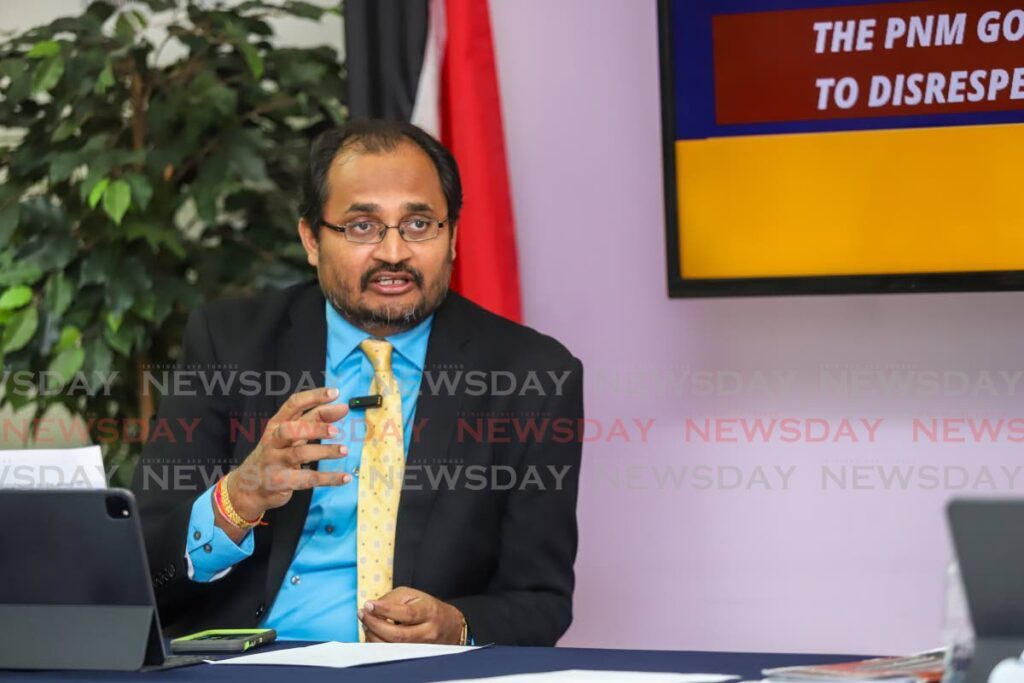Crime crisis, political paralysis

DINESH RAMBALLY
IN THE early hours of October 19, former president of the Penal/Debe Chamber of Commerce, Rampersad Sieuraj, experienced the terrifying reality of Trinidad and Tobago’s escalating crime problem.
Attacked and robbed in his own home, Sieuraj’s struggle with armed intruders left him with a dislocated elbow and a head wound. Fortunately, he survived, but his account of the incident – coupled with his stark criticism of the state of crime in this country – paints a grim picture of where we stand as a nation.
Sieuraj, a respected figure in the business community, lamented that our society seems to have become "immune to crime" and likened our current trajectory to that of Haiti, where lawlessness has crippled an entire nation.
With over 500 murders already reported this year, it is hard to disagree. We are facing a crime crisis. The question now is: how do we fix it?
As the Member of Parliament for Chaguanas West, I am acutely aware of the fear and hopelessness permeating our communities. Yet despite the escalating violence, the political response to crime remains paralysed. When leadership and collaboration are most needed, politicians remain committed to petty gamesmanship.
It should be evident that crime affects every citizen, regardless of political affiliation. And yet we find ourselves in a situation where critical legislation, policies, and reforms are only proposed and supported, and often stalled, when it is politically convenient for one party or the other.
When critical crime-fighting legislation comes before the House, it is met with resistance – not because the legislation is inherently flawed, but because it is politically convenient to object to it.
Similarly, the Government has shown reluctance to embrace any suggestion that might be seen as a concession to the opposition.
A good example is Sieuraj’s call for a limited state of emergency (SoE) in certain crime hotspots. This proposal must be discussed rationally and pragmatically.
There are valid concerns about the potential for abuse of power and infringement of citizens' rights under an SoE. However, there is also an undeniable need for immediate action in areas where crime has spiralled out of control.
We must be able to discuss what went right during the last SoE and learn from its mistakes. Yet, the government seems to have ruled out an SoE. This stance appears to be less about constitutional concerns and more about avoiding a policy once implemented by the former People's Partnership government.
There's also the uncomfortable reality that some of TT’s most dangerous neighbourhoods are in PNM-controlled constituencies, whose residents may protest (willingly or not) a limited SoE or a crackdown on gangs.
Similarly, the Opposition Leader’s stance seems to fluctuate when politically convenient. After being invited to take part in a bipartisan committee on crime, she refused to attend because former commissioner of police Gary Griffith was not invited.
During last year’s local government election, the Opposition Leader touted Griffith as the best CoP our country has seen, forming a political alliance with him. Now, after falling out with him, she discredits his efforts as CoP. Thus the bipartisan committee was derailed for no apparent reason, to the detriment of citizens.
The committee could have, inter alia, tackled the two connected issues of border control and illegal firearms. A major driver of the crime issue is the ease with which criminals obtain illegal firearms, and our porous borders play a significant role in this.
Sieuraj rightly pointed out that the Minister of National Security is well aware of the unsupervised borders. But instead of action, we get endless political finger-pointing over who bought more vessels or provided more funding to the Coast Guard.
This political tug-of-war must end if we are to confront the crime crisis. Both parties need to recognise that crime is no longer an issue that can be solved by traditional means. It requires innovative solutions, courageous decision-making, and, most importantly, bipartisan effort.
In addition to crime, we must simultaneously look at criminal justice reform. Criminal justice reform must also move beyond punitive measures to embrace restorative justice, focusing on healing and reintegrating individuals into society.
Our current system is failing to rehabilitate offenders, evidenced by high recidivism rates and overcrowded prisons. Comprehensive reforms are necessary, including improvements to the judicial process for swift, fair trials; strengthening community policing; and investing in rehabilitation and reintegration programmes for ex-offenders.
Without addressing these systemic issues in tandem, any efforts to curb crime will remain ineffective. If we continue to allow political gamesmanship to dictate how we approach crime, we will never find a solution.
It is not too late for the government and opposition to show the political leadership needed to bring about real change. As Sieuraj said, “We are in crisis. We need to take crisis decisions.” Those decisions must be based on what’s best for the country, not political convenience.
Dinesh Rambally is the MP for Chaguanas West

Comments
"Crime crisis, political paralysis"